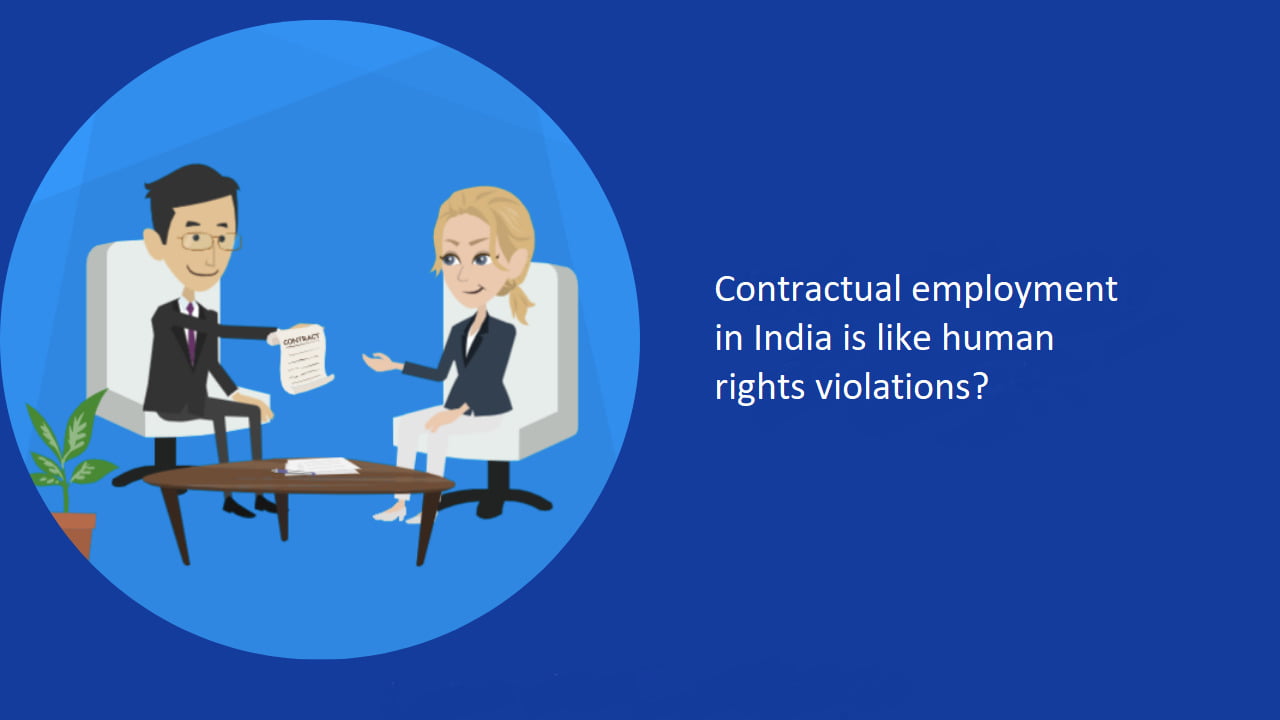Contractual employment in India is like human rights violations

Contractual employment in India is like human rights violations and violation of labor laws
Contractual employment, also known as contract employment or temporary employment, is a type of work arrangement where an individual is hired for a specific period or task under a contract with an employer.
In this setup, the terms and conditions of employment, including the duration of the contract, the nature of the work, and the compensation, are clearly defined in a written agreement between the employer and the employee.
As of the latest update, contractual employment in India has been a subject of debate and concern due to certain issues related to workers’ rights and job security. However, it would be inaccurate and inappropriate to equate contractual employment with human rights violations outright. Let’s understand the situation more comprehensively:
1. Contractual Employment:
Contractual employment is a form of work arrangement where an individual is hired for a specific period or task, usually under a fixed-term contract. These contracts outline the terms and conditions of employment, including the duration, scope of work, and compensation.
2. Concerns with Contractual Employment in India:
There are some legitimate concerns related to contractual employment in India:
a. Lack of Job Security: Contractual employees might not enjoy the same job security as permanent employees, and they could be easily terminated when the contract expires. They often face uncertainty about the continuity of their job beyond the contract period. The fear of unemployment or not having a stable income can lead to heightened stress and decreased job satisfaction.
b. Limited Benefits: Contractual workers may not receive the same benefits and social security protections as regular employees, such as provident fund contributions, gratuity, health insurance, etc. The absence of essential benefits such as health insurance, retirement plans, and paid time off can make them feel undervalued and less motivated.
c. Wage Disparities: Contractual employees may sometimes receive lower wages than their permanent counterparts, leading to wage disparities for similar work. The morale of contractual employees can be significantly affected due to wage disparities because they are doing the same job even more sometimes as the permanent employee of similar type.
d. Unclear Expectations: If expectations and deliverables are not clearly communicated to contractual employees, they may feel disoriented and less confident in their roles.
e. Unequal Treatment: If contractual employees perceive that they are treated differently or unfairly compared to regular employees, it can lead to a decrease in morale and job satisfaction.
f. Labor Law Exploitation: Some employers might misuse the contractual employment system to avoid adhering to labor laws and regulations, leading to potential exploitation of workers’ rights.
3. Human Rights Violations:
While the concerns mentioned above are undoubtedly serious and need addressing, it’s essential to differentiate between labor rights issues and actual human rights violations. Human rights violations involve severe and systemic abuses, often infringing upon fundamental human rights, such as freedom from torture, arbitrary detention, discrimination, forced labor, and other grave violations.
4. Legal Protections:
India has various labor laws that protect workers’ rights, including contractual employees. The Contract Labour (Regulation and Abolition) Act, 1970, aims to regulate the working conditions and prevent exploitation of contract labor. Additionally, the country’s labor laws provide certain rights and protections to workers, irrespective of their employment type.
5. Ongoing Reforms:
Over the years, there have been discussions and efforts to reform labor laws and improve the conditions for contractual workers in India to address the issues raised by various stakeholders.
In conclusion, while contractual employment in India has faced criticism due to certain issues, it is crucial to avoid blanket statements. Addressing the concerns and ensuring proper implementation of labor laws is vital to safeguard workers’ rights and promote a fair and equitable work environment for all. As the situation may have evolved while you reading this post, it’s advisable to refer to the latest information and sources to get the most accurate and up-to-date picture.






